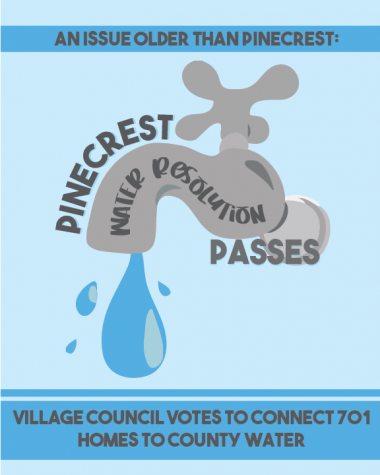An Issue Older Than Pinecrest: Village Council Votes to Connect 701 Homes to County Water
May 15, 2021

At the monthly Pinecrest Village Council meeting this past Tuesday, council members approved a resolution to spend $11.5 million to finish connecting all of Pinecrest’s homes to the Miami-Dade County water systems. Through the addition of approximately 191 hydrants, the resolution also facilitates the completion of the Village-wide hydrant system.
Before the incorporation of Pinecrest, farmers used the land mainly for agriculture, and the minimal properties used well water. As the years went on, more and more homes underwent construction alongside water lines to connect the new homes to county water. However, the current problems stem from the patchwork of the water lines that left older homes on well water supply.
“It’s a priority for Pinecrest because we believe that everyone has a right to access clean, secure drinking water. We don’t have a sanitary sewer system… so when we flush our toilets that water goes into a septic tank and filters into the ground. At the same time we draw our drinking water from that same ground,” Pinecrest Mayor Joseph Corradino said. “This has not been acceptable in the most rural of areas for centuries. It’s certainly not acceptable in Pinecrest in 2021.”
According to the Potable Water Project FAQ, all homeowners on well water must pay a special assessment tax costing around $1 per day for the next 25 years. They also have the option to prepay for an estimated $5,556, giving residents over $3,000 in savings.
The American Rescue Plan covers the bulk of the cost, with the Biden administration allocating Pinecrest $8.1 million of the $1.9 trillion COVID-19 stimulus package. The funds must be spent on infrastructure projects such as water, sewer and broadband projects by Dec. 31, 2024.
Even still, some homeowners do not want to pay the cost and would rather stay on well water. An anonymous Pinecrest resident began a petition to stop the project and has dropped off pamphlets in support of their cause to homes throughout Pinecrest. As of today the petition has 147 signatures.
“Forced connections are an abuse of government power. Once you lose your valuable well water, it is gone forever,” the unidentified author of the petition said.
In response to the petition, Corradino embraces the criticism.
“We welcome all opinions and viewpoints. It’s through a healthy, vigorous and collegial debate that we can get to the heart of the issues, make the necessary compromises and make the best decisions for everyone,” Corradino said. “I have confidence in Pinecrest that we will create a project that will be the most beneficial it can be.”
Pinecrest residents have long debated if and how to connect all homes to county water. In March of 2019, Pinecrest held a special election to see whether or not residents would support a $15 million bond to connect around 700 homes to county water. Residents were passionate about the issue, with the voter turnout around 44%, and the issue failed with 62% of residents voting “no.”
“Though the 2019 referendum was a loss at the time, I now see it as a gift,” Pinecrest Councilmember Anna Hochkammer said. “Well-dependent residents understood that the community didn’t want to bear the cost through a bond to finish the water infrastructure, so when the money from the American Rescue Plan was announced and reduced the cost for homeowners, everyone involved knew this was the most viable option. It was a conversation they’d already had, and a cost they’d already thought about.”
The bond would have taxed all Pinecrest residents 23 cents per $1,000 of property value, or around $158 per year for an average home in Pinecrest. The idea that all residents had to pay for only a few to benefit made the issue unpopular and contributed to the failure of the special election.
In contrast, the Village Council meeting on Tuesday had 54 speakers, with 50 in favor of the resolution. Now that the resolution has passed, they have begun to prepare for the project’s 18 month construction timeline. Hochkammer anticipates construction beginning in late August to early September.
“You may see some activity where a lane is closed here or there, but the majority of constructions will be done in interior neighborhoods. It’s likely not going to have a huge impact on our traffic,” Hochkammer said.
Once construction subsides and the water lines activate, homeowners have 10 years to hook up to county water. Pinecrest estimates the cost for residents to connect to range from an estimated $2,000-$5,000.
Residents must then become a customer of the Miami-Dade County Water and Sewer Department. Afterwards, they must install a water meter on their property to measure how much water they have consumed and be charged accordingly. If residents cannot afford the costs, the Village will work to develop a program for them. Ultimately, the Village wants to make sure everyone has access to a safe and secure water source.
“We have the looming threat of sea level rise, saltwater intrusion and well contamination. If your home is on well water, and that well fails…and you don’t have access to potable water, you have rendered your house unlivable,” Hochkammer said. “To make our community resilient and secure for the long term we must invest in infrastructure.”










